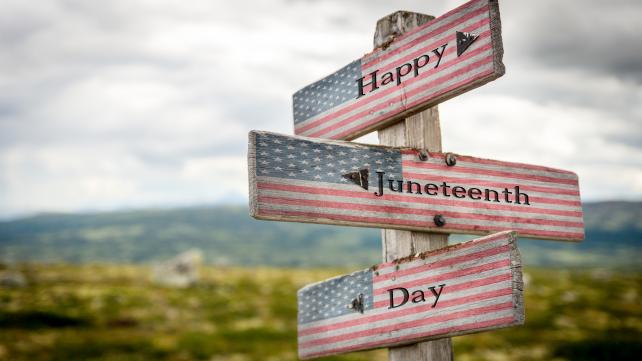
In 2021, the United States finally acknowledged “Juneteenth” as a national holiday for all Americans to reflect upon the experiences of America’s most persecuted ethnic minority – Americans of African descent.
The Juneteenth holiday was as reluctantly acknowledged on a national level as the reading of General Granger’s General Order Number 3 that ‘freed’ the enslaved citizens of Texas – three years after the Emancipation Proclamation. This was a journey that took over 150 years.
Juneteenth originated in Galveston, Texas and has been celebrated annually on June 19 in various parts of the United States since 1865. Juneteenth is also known as Emancipation and Independence Day in the African-American community because of its significance. The struggle is ongoing to be acknowledged, honored, and appreciated in a socio-cultural construct that deliberately distorts the history and achievements of Americans of African descent, while minimizing the atrocities perpetrated against them. Indeed the “Black Lives Matter'' movement is not a slogan, but a 400-year endeavor and request. The experiences of these peoples of African descent is unique and often misunderstood because of purposeful distortion.
Below is a list of Muslim authors who have written specifically about the “Black American” experience and Islam, which offers a compelling insight and historical perspective.
Al-Hajj Wali Akbar Muhammad, Muslims in Georgia 1771-1965: A Historical View (2012)
Aminah McCloud, African American Islam (1994).
Asad el Malik, Bismillah & Bean Pies: How Black Americans Crafted an Islamic Expression through Nationalism (2016)
Hishaam Aidi, “‘Let Us Be Moors”: Islam, Race and ‘Connected Histories’”, Middle East Research and Information Project, 229 http://www.merip.org/mer/mer229/let-us-be-moors
Ikhlas Saleem, “There’s Nothing Regular About Being Black and Muslim in America”, Buzzfeed (June 25, 2016) https://www.buzzfeed.com/ikhlassaleem/the-hybrid?utm_term=.iaZ50p3G1#.gyyaYXAeN
Imam Abdur-Rahim Muhammad, The Life Adventures of Imam (hajji) 'Abdur-Rahim Muhammad (2016)
Imam Luqman A. Ahmad, Double Edged Slavery: How African American Muslims Have Been Colonized (2016)
Imam W. Deen Mohammed, And Follow the Best Thereof (2013)
Jamil Al-Amin, Revolution by the Book: The Rap is Live (1993)
Jamillah Karim, “Voices of faith, faces of beauty: connecting American Muslim women through Azizah” in Muslim Networks from Hajj to Hip Hop, eds. miriam cooke and Bruce Lawrence (2005).
Jamillah Karim, American Muslim Women: Negotiating Race, Class, and Gender within the Ummah (2009)
Kambiz GhaneaBassiri, A History of Islam in America: From the New World to the New World Order (2010)
Khaled A. Beydoun, “Antebellum Islam”, Howard Law Journal, 58/1 (2014)
Layla Abdullah, “White Racial Rhetoric & Black American Muslims” https://storify.com/deenonthebrain/getting-started
Mahasin D. Shamsid-Deen, “African American Muslim Identity: Surviving the Assault “ https://aboutislam.net/family-life/culture/the-muslim-ness-of-african-americans/’
Margari Aziza, “The Politics of Black Hair and Hijab” http://www.altmuslimah.com/2015/12/10365/
Michael Saahir, The Honorable Elijah Muhammad: The Man Behind the Men (2011)
Moustafa Bayoumi, “East of the Sun (West of the Moon): Islam, the Ahmadis, and African America”, Journal of Asian American Studies, 4/3 (2001), pp. 251-263
Muhammed Abdullah al-Ahari, Bilali Muhammad: Muslim Jurisprudist in Antebellum Georgia (2010)
Muhammad A. Al-Ahari (editor), Five Classic Muslim Slave Narratives (2011)
Naeem Mohaiemen, “Fear of a Muslim Planet: Hip-Hop’s Hidden History” http://archive.thedailystar.net/forum/2008/june/fear.htm
Precious Rasheeda Muhammad, “‘Oh, Allah, Operate on Us!’: Islam and the Legacy of American Slavery in Michael Wolfe (ed.), Taking Back Islam: American Muslims Reclaim Their Faith (Rodale Press, 2002), pp. 129-135
Ruqayyah Daud, “Black in the Muslim Student Association”, Alt Muslimah (Dec 8, 2016) http://www.altmuslimah.com/2016/12/black-muslim-students-association/?platform=hootsuite
Dr. Qadir Abdus-Sabur, Spirituality: Cornerstone of African American Education, 2nd Edition Paperback (2019)
Samory Rashid, Black Muslims in the U.S.: History, Politics, and the Struggle of a Community (2013)
Sara Aceves, Ain’t I a Muslim Woman? African American Muslim Women Practicing “Multiple Critique” (2010) http://scholarship.claremont.edu/cgi/viewcontent.cgi?article=1037&context=pomona_theses
Sherman Jackson, Islam and the Black American: Looking Toward the Third Resurrection (2011).
Su’ad Abdul Khabeer, “Africa as Tradition in U.S. African American Muslim Identity”, Journal of Africana Religions, 5/1 (2017), pp. 26-49
Sultana Afroz, “Invisible Yet Invincible: The Muslim Ummah in Jamaica”, Journal of Muslim Minority Affairs, 23/1 (2003), pp. 211-222
Sumayya Ahmed, “Islam is a Black American”, ISLAMiCommentary (Dec 11, 2015)
Zaid Shakir, Scattered Pictures: Reflections of an American Muslim (2007)
Zain Abdullah, Black Mecca: The African Muslims of Harlem (2010)
Zaheer Ali, “Return to Roots: African Americans Return to Islam through Many Paths”, Islamic Horizons (July/August 2005), pp. 16-35.
Zakiyyah Muhammad, “Faith and Courage to Educate Our Own: Reflections on Islamic Schools in the African American Community” in Joyce E. King (ed.), Black Education: A Transformative Research and Action Agenda for the New Century (2005), pp. 261-279.
Zakiyyah Muhammad, “Muslim African American Women: The Qur’an, Human Excellence and the Four Rivers,” in Lopez D. Matthews, Jr. and Kenvi C. Phillips (eds.), Liberating Minds, Liberating Society: Black Women in the Development of American Culture and Society, (Create Space Independent Publishing, 2014), p. 143-158.



Add new comment